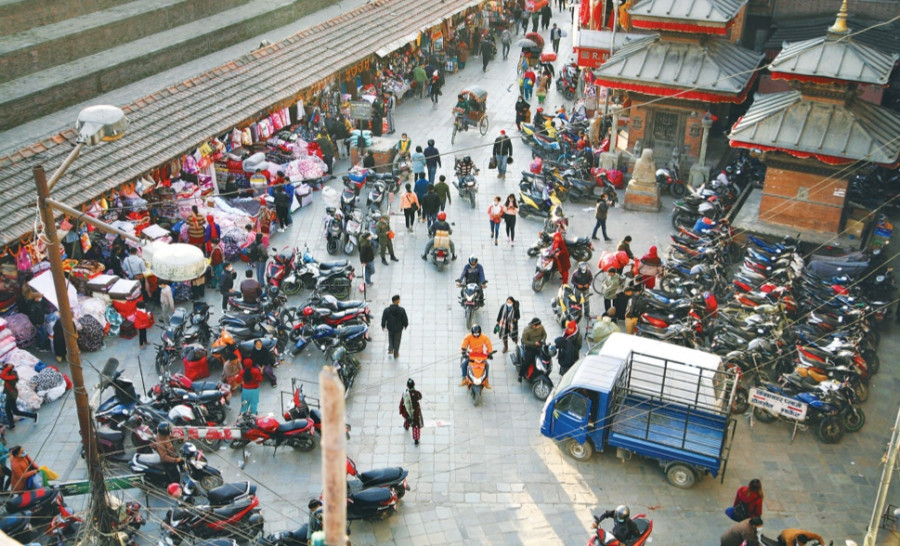Valley
Vacate Durbar Square shops in a week, City tells Department of Archaeology
Officials at the department say Kathmandu Mayor Shakya is on the offensive after it directed the city to follow traditional methods while rehabilitating Kamal Pokhari.
Anup Ojha
Kathmandu Metropolitan City seems to be in a confrontational mode with the Department of Archaeology. The two entities have a long history of being at loggerheads starting from the restoration of Ranipokhari that was damaged in the 2015 earthquake.
Now the two agencies have been arguing over Kathmandu Metropolitan City’s plan to give a facelift to Kamal Pokhari into which the Department of Archaeology had decided to wade in after heritage activists cried foul over the City’s design to use concrete.
In the latest episode of clash between the two, Kathmandu Metropolitan City on Friday sent a letter to the Department of Archaeology asking it to vacate the ‘unauthorised ’ shops and businesses that are being run at heritage sites.
“According to the Local Government Governance Act-2017, Kathmandu Metropolitan City Building Code-2018, and Ancient Monument Preservation Act-1956, the preservation, repair and restoration of Basantapur Hanumandhoka Durbar areas as well as removing the unauthorised businesses there and use of the area falls within the primary responsibility of this office [Kathmandu Metropolitan City],” reads the letter to department. “We have received public complaints of businesses being run in buildings within the area, which the department should be overseeing, despite their archeological importance.”
The City has asked the Department of Archeology to remove all the shops and businesses north of Juddha Fire Brigade offices as well as those next to Taleju Temple within a week.
However, when the Post contacted Damodar Gautam, chief at the Archaeology Department, he said he has been on leave for two days and is not aware of the City’s letter.
“I am yet to go through the letter from the city,” said Gautam.
But when the Post briefed him on the contents of the letter, he said that it was shameful for an elected mayor to say such things.
Officials at the department said that Kathmandu Metropolitan City’s decision was in retaliation for the department last week sending a letter to it to follow the traditional methods while restoring Kamal Pokhari.
“Earlier the Department of Archeology had asked Kathmandu Metropolitan City to follow traditional methods while rehabilitating Kamal Pokhari, and this seems to have irked the mayor,” said an official at the department who didn't want to be named.
Following widespread criticism from citizens’ groups and heritage lovers who claim that the historic pond is being desecrated in the name of rehabilitation, the department had sent its staff to the pond and had asked the city to follow the traditional measures to rebuild the pond.
After the department's letter, Mayor Bidya Sundar Shakya has been on the offensive against the department. On Sunday speaking at a programme while laying the foundation of Seto Machhindranath Temple, Shakya had lashed out at the department for the delay of reconstruction work.
“I am not sure whether the mayor and the chief of the city should use such derogatory language. He is in a respected position, and I do not know why he said those things in public,” said Gautam, reacting to the mayor’s remarks. “Better you ask him why he used such language.”
In his speech on Sunday, Mayor Shakya had even vented out anger at the department for running a hotel inside Hanuman Dhoka and getting rent out of it. “If those hotels and shops are not removed in one week, the City will remove them in association with locals,” said Shakya.
According to Hanumandhoka Palace and Management and Conservation Office under the Ministry of Culture, Tourism and Civil Aviation, at present there are around 40 business houses in the area and these include restaurants, cafes, clothing shops, curio and pashmina shops.
“These shops have been operating for nearly a decade, and with the money repair and renovation of this Durbar Square takes place. It seems that the City writing letter to the DoA to vacate shops is just a way to project its anger and frustration,” said Jay Narayan Karki of the conservation office.
According to him, the office has been raising around Rs 100 million in rent annually.
“Giving just a week is not enough to vacant those shops,” he told the Post.
Prakash Shrestha, 56, who has been running a souvenir shop in the Durbar Square area for the last five years said he doesn't know anything about the City’s letter.
“How can the City remove us, as we are running our shop with contracts, and have been paying rent regularly?” Shrestha asked.
Local residents are instead angry about unplanned parking, unmanaged roadside shops, and an increasing number of illegal activities such as prostitution and drug peddling in the area since the pandemic began. Local residents and heritage conservationists have been asking questions to the Kathmandu Metropolitan City and concerned stakeholders to curb such activities and bring order inside the UNESCO World Heritage Site.
Ganapati Lal Shrestha, a conservation activist and local resident of Basantapur area, said the intent of the City is wrong.
“The City could have played a lead role cooperating with all the stakeholders to preserve and protect this historic area,” said Shrestha. “But the mayor telling the DoA to empty the particular areas by a certain date is not wise. It seems the mayor is driven by his personal ego rather than the betterment of the society and culture.”




 13.12°C Kathmandu
13.12°C Kathmandu.jpg)













